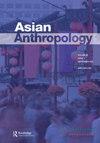African transnational mobility in China: Africans on the move
Q2 Social Sciences
引用次数: 4
Abstract
may interpret as Chinese government propaganda but do indeed learn the Chinese language to varying degrees and do indeed learn much from the fellow globalized humanity of their Chinese teachers. Since this ethnography is limited in its scope, it hardly negates Sahlins’ critique, but it does vividly show the human and more complex dimension of Confucius Classrooms in one particular American setting. I have criticisms of Hubbert’s book – in particular, I wish that she had focused more fully on American students of Asian ancestry and particularly of Chinese ancestry, because their experiences of Confucius Classrooms were no doubt significantly different in many respects than those of students of European background. Still, I highly recommend this book. In the highly charged world of global political rivalry that we are now in, Hubbert provides a nuanced portrayal of how Confucius Classrooms in the United States actually work in practice. This is a valuable contribution, showing the value of ethnography in enabling us to better understand the variegated micro-complexities of global ideological conflict.非洲人在中国的跨国流动:流动中的非洲人
可能会解释为中国政府的宣传,但他们确实在不同程度上学习了汉语,也确实从他们的中国老师那里学到了很多全球化的人性。由于这本民族志的范围有限,它很难否定萨林斯的批评,但它确实生动地展示了孔子课堂在一个特定的美国背景下的人性和更复杂的维度。我对Hubbert的书有一些批评——特别是,我希望她能更全面地关注亚洲血统的美国学生,尤其是华裔学生,因为他们在孔子课堂上的经历无疑在许多方面与欧洲背景的学生有很大的不同。尽管如此,我还是强烈推荐这本书。在我们现在所处的这个高度紧张的全球政治竞争的世界里,哈伯特细致入微地描绘了孔子课堂在美国的实际运作情况。这是一个有价值的贡献,显示了民族志的价值,使我们能够更好地理解全球意识形态冲突的各种微观复杂性。
本文章由计算机程序翻译,如有差异,请以英文原文为准。
求助全文
约1分钟内获得全文
求助全文
来源期刊

Asian anthropology
Social Sciences-Anthropology
CiteScore
1.60
自引率
0.00%
发文量
25
期刊介绍:
Asian Anthropology seeks to bring interesting and exciting new anthropological research on Asia to a global audience. Until recently, anthropologists writing on a range of Asian topics in English but seeking a global audience have had to depend largely on Western-based journals to publish their works. Given the increasing number of indigenous anthropologists and anthropologists based in Asia, as well as the increasing interest in Asia among anthropologists everywhere, it is important to have an anthropology journal that is refereed on a global basis but that is editorially Asian-based. Asian Anthropology is editorially based in Hong Kong, Taiwan, and Japan, but welcomes contributions from anthropologists and anthropology-related scholars throughout the world with an interest in Asia, especially East Asia as well as Southeast and South Asia. While the language of the journal is English, we also seek original works translated into English, which will facilitate greater participation and scholarly exchange. The journal will provide a forum for anthropologists working on Asia, in the broadest sense of the term "Asia". We seek your general support through submissions, subscriptions, and comments.
 求助内容:
求助内容: 应助结果提醒方式:
应助结果提醒方式:


